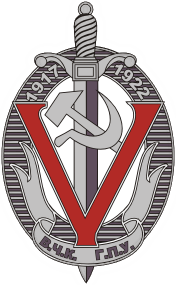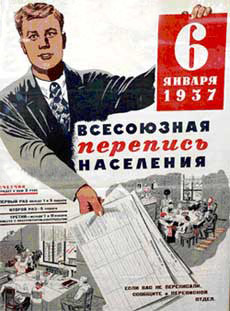
The All-Russian Extraordinary Commission, abbreviated as VChK, and commonly known as the Cheka, was the first Soviet secret police organization. It was established on 20 December [O.S. 7 December] 1917 by the Council of People's Commissars of the Russian SFSR, and was led by Felix Dzerzhinsky. By the end of the Russian Civil War in 1921, the Cheka had at least 200,000 personnel.

Perestroika was a political reform movement within the Communist Party of the Soviet Union (CPSU) during the late 1980s, widely associated with CPSU general secretary Mikhail Gorbachev and his glasnost policy reform. The literal meaning of perestroika is "restructuring", referring to the restructuring of the political economy of the Soviet Union, in an attempt to end the Era of Stagnation.
The Soviet calendar was a modified Gregorian calendar that was used in Soviet Russia between 1918 and 1940. Several variations were used during that time.

Supreme Soviet of the National Economy, Superior Soviet of the People's Economy, was the superior state institution for management of the economy of the RSFSR and later of the Soviet Union. There were two institutions with this name, at different times, 1917–1932 and 1963–1965.

Special settlements in the Soviet Union were the result of population transfers and were performed in a series of operations organized according to social class or nationality of the deported. Resettling of "enemy classes" such as prosperous peasants and entire populations by ethnicity was a method of political repression in the Soviet Union, although separate from the Gulag system of penal labor. Involuntary settlement played a role in the colonization of virgin lands of the Soviet Union. This role was specifically mentioned in the first Soviet decrees about involuntary labor camps. Compared to the Gulag labor camps, the involuntary settlements had the appearance of "normal" settlements: people lived in families, and there was slightly more freedom of movement; however, that was permitted only within a small specified area. All settlers were overseen by the NKVD; once a month a person had to register at a local law enforcement office at a selsoviet in rural areas or at a militsiya department in urban settlements. As second-class citizens, deported peoples designated as "special settlers" were prohibited from holding a variety of jobs, returning to their region of origin, attending prestigious schools, and even joining the cosmonaut program. Due to this special settlements have been called by J. Otto Pohl a type of apartheid.
The German Empire established diplomatic relations with the Republic of China in October 1913. After World War I and the creation of the Weimar Republic, Germany followed a policy of friendship towards China. Nazi Germany and the Nationalist government of the Republic of China maintained bilateral relations between 1933 and 1941. The Chinese Nationalists sought German military and economic support to help them consolidate control over factional warlords and resist Japanese imperialism. Germany sought raw materials such as tungsten and antimony from China. During the mid-1930s, thousands of Chinese soldiers were trained by German officers and German economic investment made its way into China. However, Joachim von Ribbentrop strongly favored an alliance with Japan over one with China, and starting with the 1936 Anti-Comintern Pact, Germany began to realign its East Asia policy. After Japan invaded China in 1937 and Ribbentrop became Foreign Minister the following year, German aid to China was cut off. In July 1941, Nazi Germany severed relations with Nationalist China and transferred their recognition to the Japanese-controlled Wang Jingwei regime. Nonetheless, China did not officially declare war on the Axis Powers until after the attack on Pearl Harbor.

Foreign concessions in China were a group of concessions that existed during late Imperial China and the Republic of China, which were governed and occupied by foreign powers, and are frequently associated with colonialism and imperialism.
Publishing houses in the Soviet Union were a series of publishing enterprises which existed in the Soviet Union.
The Council of Labor and Defense, first established as the Council of Workers' and Peasants' Defense in November 1918, was an agency responsible for the central management of the economy and production of military materiel in the Russian Socialist Federative Soviet Republic and later in the Soviet Union. During the Russian Civil War of 1917-1922 the council served as an emergency "national economic cabinet", issuing emergency decrees in an effort to sustain industrial production for the Red Army amidst economic collapse. In 1920–23 it existed on the rights of the commission of the Russian Sovnarkom and after 1923 of the Soviet Council of People's Commissariats. The Central Executive Committee of the Soviet Union abolished the council on 28 April 1937. Its functions were split between the Economic Council of the Council of People's Commissars of the Soviet Union and the Defense Committee of the Council of People's Commissars of the Soviet Union.

The 1937 Soviet census held on January 6, 1937, was the most controversial of the censuses taken within the Soviet Union. The census showed lower population figures than anticipated, although it still showed a population growth from the last census in 1926, from 147 million to 162 million people in 1937. The results of the census were almost immediately announced to be "harmful" and the workers who were responsible for it were arrested and repressed.

The Ministry of Communications of the Union of Soviet Socialist Republics (USSR) (Russian: Министерство связи СССР) was the central state administration body on communications in the Soviet Union from 1923 to 1991. During its existence it had three names: People's Commissariat for Posts and Telegraphs (1923–32), People's Commissariat for Communications (1932–46) and Ministry of Communications (1946–1991). It had authority over the postal, telegraph and telephone communications as well as public radio, technical means of radio and television broadcasting, and the distribution of periodicals in the country.

The passport system of the Union of Soviet Socialist Republics was an organisational framework of the single national civil registration system based upon identification documents, and managed in accordance with the laws by ministries and other governmental bodies authorised by the Constitution of the USSR in the sphere of internal affairs.

Soviet Union–Turkey relations were the diplomatic relations between the Soviet Union and the Republic of Turkey.

Alexei Ivanovich Rykov was a Russian Bolshevik revolutionary and a Soviet politician and statesman, most prominent as premier of Russia and the Soviet Union from 1924 to 1929 and 1924 to 1930 respectively. He was one of the accused in Joseph Stalin's show trials during the Great Purge.

The State Planning Committee, commonly known as Gosplan , was the agency responsible for central economic planning in the Soviet Union. Established in 1921 and remaining in existence until the dissolution of the Soviet Union in 1991, Gosplan had as its main task the creation and administration of a series of five-year plans governing the economy of the USSR.

The Council of People's Commissars (CPC) (Russian: Совет народных комиссаров (СНК), romanized: Sovet narodnykh kommissarov (SNK)), commonly known as the Sovnarkom (Совнарком), were the highest executive authorities of the Russian Soviet Federative Socialist Republic (RSFSR), the Soviet Union (USSR), and the Soviet republics from 1917 to 1946.

People's Commissariat for Posts and Telegraphs of the USSR was the central organ of the Soviet Union government that was in charge of the organisation and administration of the different forms of communication including posts. It existed between 1923 and 1932.

The Nizhny Novgorod tram network comprises 16 tramlines and uses a standard Russian broad gauge. Trams have been operating in Nizhny Novgorod since 1896, but services were interrupted for a few years following the 1917 Russian Revolution.













